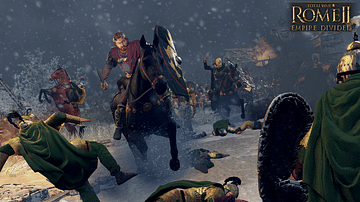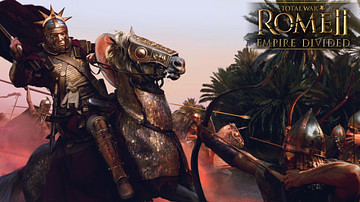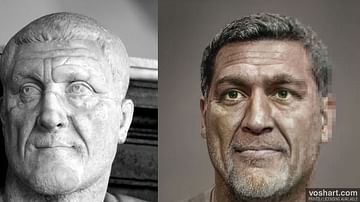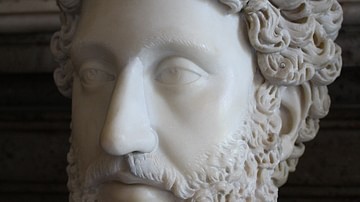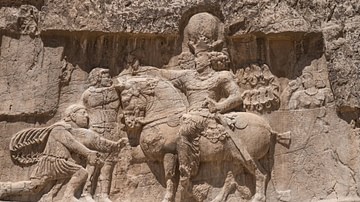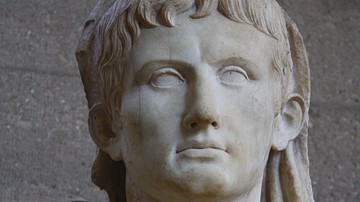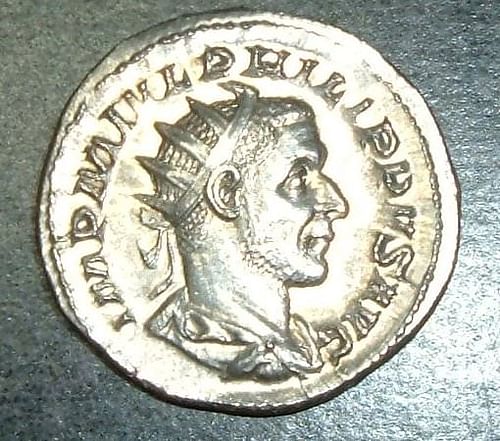
Philip the Arab ruled as emperor of the Roman Empire briefly from 244 CE to 249 CE. In 244 CE Roman emperor Gordian III responded to an uprising in the eastern provinces instigated by the Persian king Shapur. Under the superb leadership of the Praetorian Guard prefect Gaius Furius Sabina Aquila Timesitheus, the revolt was swiftly suppressed. Unfortunately, after the commander's sudden death, his successor, Philip the Arab, grew disillusioned with his role as the new commander and set his sights much higher - the imperial throne. According to the Historia Augusta, “This Philip was low born but arrogant and now could not contain himself in his sudden rise to the office and immoderate good fortune, but immediately, through the soldiers, began to plot against Gordian, who had begun to trust him as a father.”
While pretending devotion to the inexperienced emperor, Philip spread false rumors among the troops that the emperor was incompetent and too young to rule. When Philip failed to follow the emperor's orders to attack Ctesiphon, Gordian grew impatient and “accused Philip of being unmindful of past favours and too little grateful.” He gave the army a choice: him or Philip. They chose Philip. Although the emperor pleaded for his life to be spared, Gordian met his death on February 25, 244 CE near the city of Zaitha on the Euphrates River. His body was cremated and returned to Rome. Without waiting for the Roman Senate to decide, Philip assumed the throne.
Marcus Julius Verus Philippus was born in 204 CE at Philippopolis in Southwestern Syria, the son of an Arab chieftain named Marinus. He would be the first of his race to become emperor. Philip rose quickly through the ranks and when King Shapur instigated his revolt in the east, he traveled with Gordian as deputy prefect of the Praetorian Guard. With the death of Timesitheus (possibly at the hands of the ambitious commander), Philip replaced him, but unlike his predecessor, decided he wanted the imperial throne. However, Gordian stood between him and his dream.
Behind the young emperor's back, the commander blamed the lack of food and late shipments of grain on Gordian's inability to rule. When orders were given to attack the Persian capital, Philip resisted, claiming that the emperor was incompetent. According to the Historia Augusta, the cunning Philip was behind the late shipments:
…Timesitheus had stored up such a quantity of supplies everywhere that the Roman administration could not break down. But now Philip intrigued first to have the grain-ships turned away, and then to have the troops moved to stations where they could not get provisions. In this way he speedily got them exasperated against Gordian, for they did not know that the youth had been betrayed through Philip's intriguing.
Afterwards Philip added, “…it was better for someone to rule who could command the army and understood public affairs.”
To the Roman Senate, Philip sent a letter, claiming that Gordian had died of natural causes. They accepted this assertion - Philip was seen as a very personable individual - and quickly appointed him as the new emperor. Seeing the need to consolidate his power and understanding the problems that had beset many of his predecessors, Philip realized the urgency in returning to Rome. He made a rather quick peace with King Shapur - one that included a large annual indemnity to be paid to the Persians - and departed for Rome. Before he left, he placed his brother Gaius Julius Priscus in control of the eastern provinces.
Regrettably, Philip would see little peace throughout his brief reign. Shortly after his arrival in Rome, the Dacian Carpi crossed the Danube River. When the Roman commander Severanus (Philip's brother-in-law) was unable to suppress the uprising, Philip was forced to intervene, but his victory did win him the title of Carpicus Maximus. There is also some evidence that he fought the Germans around the same time, because he was awarded the additional title of Germanicus Maximus. These victories afforded him the opportunity to appoint his five-year-old son Philip as Caesar. In 247 CE the young Caesar rose to the rank of Augustus with equal authority as his father; this included the title of chief priest. Sadly, peace did not remain along the Danube. Roman legions in Moesia and Pannonia voiced their dislike of the peace terms with the Carpi and declared their commander Tiberius Claudius Marinus Pacatianus as emperor. Pacatianus would be one among several who would soon claim the imperial throne. Philip offered to step down as emperor, but this idea was quickly dismissed. Luckily, the rebellion was short-lived, ending when Pacatinaus met his death at the hands of his own soldiers.
Philip's problems did not end there, however. His appointment of his brother to govern the east had proven to be a poor decision. Not only was Priscus financially irresponsible, but his harsh rule forced the army to name Iotapianus, who claimed to be related to the former emperor Alexander Severus, as emperor. The rebellion was stamped out in 249 CE; the would-be emperor was also killed by his own troops. Because of Philip's continued attempts to control the empire's finances through cuts in indemnity payments, other rebellions escalated along the Danube and Rhine Rivers - led by Silbannacus and Sponseanus respectively.
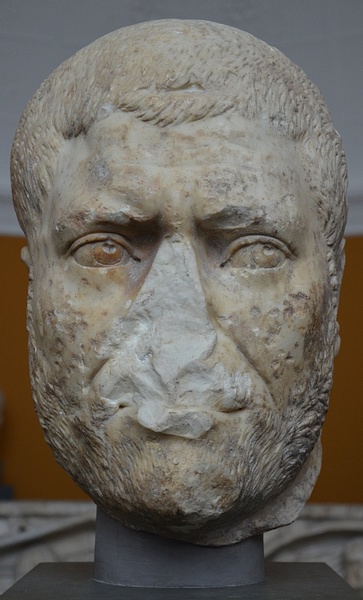
In 249 CE the Goths rebelled as, once again, Philip had cut payments promised by Gordian III. Roman legions under the ineffective command of Severanus were deserting to the Goths. Placing several legions under his command, Philip sent Quintus Decius Valerinus to be the new governor of both Moesia and Pannonian in an attempt to restore order. His leadership brought peace and stability. After the defeat of the Goths, Decius's men proclaimed him emperor. With additional legions at his disposal and the encouragement of his troops, in September of 249 CE Decius marched toward Rome. The armies of Philip and Decius met at Beroea in Macedonia where Philip met defeat and death. Shortly afterwards, his eleven-year-old son and heir was killed at the Praetorian camp in Rome, and Decius was proclaimed the new emperor.
Philip the Arab was the first of several short-lived emperors who would rule the vast Roman Empire for the next three decades. While Philip's brief reign was spent mostly in constant combat, he did make some contributions to the empire. Although his budgetary restraints caused rebellions along the borders, he did curtail abuses in the treasury. Among numerous public works projects, he built new reservoirs to relieve water shortages in Rome, and he made attempts to decentralize the government by appointing several new provincial governors. Also, despite the exorbitant price, he led the city's celebration of its one-thousandth anniversary with lavish games at the Circus Maximus. Oddly, years after his death, he was considered by some to be the first Christian emperor; a rumor circulated because of his favorable treatment of Christians; however, the fact that Philip had his father deified would seem to disprove this idea.

